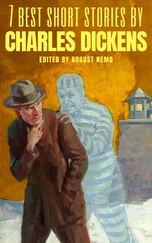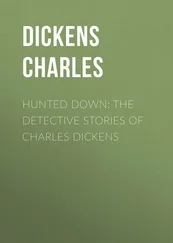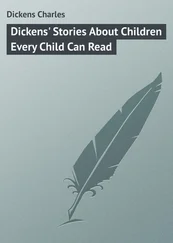Charles Dickens - Short Stories
Здесь есть возможность читать онлайн «Charles Dickens - Short Stories» весь текст электронной книги совершенно бесплатно (целиком полную версию без сокращений). В некоторых случаях можно слушать аудио, скачать через торрент в формате fb2 и присутствует краткое содержание. Жанр: Классическая проза, на английском языке. Описание произведения, (предисловие) а так же отзывы посетителей доступны на портале библиотеки ЛибКат.
- Название:Short Stories
- Автор:
- Жанр:
- Год:неизвестен
- ISBN:нет данных
- Рейтинг книги:4 / 5. Голосов: 1
-
Избранное:Добавить в избранное
- Отзывы:
-
Ваша оценка:
- 80
- 1
- 2
- 3
- 4
- 5
Short Stories: краткое содержание, описание и аннотация
Предлагаем к чтению аннотацию, описание, краткое содержание или предисловие (зависит от того, что написал сам автор книги «Short Stories»). Если вы не нашли необходимую информацию о книге — напишите в комментариях, мы постараемся отыскать её.
Short Stories — читать онлайн бесплатно полную книгу (весь текст) целиком
Ниже представлен текст книги, разбитый по страницам. Система сохранения места последней прочитанной страницы, позволяет с удобством читать онлайн бесплатно книгу «Short Stories», без необходимости каждый раз заново искать на чём Вы остановились. Поставьте закладку, и сможете в любой момент перейти на страницу, на которой закончили чтение.
Интервал:
Закладка:
Our bore has a crushing brother in the East, who, somehow or other, was admitted to smoke pipes with Mehemet Ali, and instantly became an authority on the whole range of Eastern matters, from Haroun Alraschid to the present Sultan. He is in the habit of expressing mysterious opinions on this wide range of subjects, but on questions of foreign policy more particularly, to our bore, in letters; and our bore is continually sending bits of these letters to the newspapers (which they never insert), and carrying other bits about in his pocket-book. It is even whispered that he has been seen at the Foreign Office, receiving great consideration from the messengers, and having his card promptly borne into the sanctuary of the temple. The havoc committed in society by this Eastern brother is beyond belief. Our bore is always ready with him. We have known our bore to fall upon an intelligent young sojourner in the wilderness, in the first sentence of a narrative, and beat all confidence out of him with one blow of his brother. He became omniscient, as to foreign policy, in the smoking of those pipes with Mehemet Ali. The balance of power in Europe, the machinations of the Jesuits, the gentle and humanising influence of Austria, the position and prospects of that hero of the noble soul who is worshipped by happy France, are all easy reading to our bore's brother. And our bore is so provokingly self-denying about him! 'I don't pretend to more than a very general knowledge of these subjects myself,' says he, after enervating the intellects of several strong men, 'but these are my brother's opinions, and I believe he is known to be well-informed.'
The commonest incidents and places would appear to have been made special, expressly for our bore. Ask him whether he ever chanced to walk, between seven and eight in the morning, down St. James's Street, London, and he will tell you, never in his life but once. But, it's curious that that once was in eighteen thirty; and that as our bore was walking down the street you have just mentioned, at the hour you have just mentioned – half-past seven – or twenty minutes to eight. No! Let him be correct! – exactly a quarter before eight by the palace clock – he met a fresh-coloured, grey– haired, good-humoured looking gentleman, with a brown umbrella, who, as he passed him, touched his hat and said, 'Fine morning, sir, fine morning!' – William the Fourth!
Ask our bore whether he has seen Mr. Barry's new Houses of Parliament, and he will reply that he has not yet inspected them minutely, but, that you remind him that it was his singular fortune to be the last man to see the old Houses of Parliament before the fire broke out. It happened in this way. Poor John Spine, the celebrated novelist, had taken him over to South Lambeth to read to him the last few chapters of what was certainly his best book – as our bore told him at the time, adding, 'Now, my dear John, touch it, and you'll spoil it!' – and our bore was going back to the club by way of Millbank and Parliament Street, when he stopped to think of Canning, and look at the Houses of Parliament. Now, you know far more of the philosophy of Mind than our bore does, and are much better able to explain to him than he is to explain to you why or wherefore, at that particular time, the thought of fire should come into his head. But, it did. It did. He thought, What a national calamity if an edifice connected with so many associations should be consumed by fire! At that time there was not a single soul in the street but himself. All was quiet, dark, and solitary. After contemplating the building for a minute – or, say a minute and a half, not more – our bore proceeded on his way, mechanically repeating, What a national calamity if such an edifice, connected with such associations, should be destroyed by – A man coming towards him in a violent state of agitation completed the sentence, with the exclamation, Fire! Our bore looked round, and the whole structure was in a blaze.
In harmony and union with these experiences, our bore never went anywhere in a steamboat but he made either the best or the worst voyage ever known on that station. Either he overheard the captain say to himself, with his hands clasped, 'We are all lost!' or the captain openly declared to him that he had never made such a run before, and never should be able to do it again. Our bore was in that express train on that railway, when they made (unknown to the passengers) the experiment of going at the rate of a hundred to miles an hour. Our bore remarked on that occasion to the other people in the carriage, 'This is too fast, but sit still!' He was at the Norwich musical festival when the extraordinary echo for which science has been wholly unable to account, was heard for the first and last time. He and the bishop heard it at the same moment, and caught each other's eye. He was present at that illumination of St. Peter's, of which the Pope is known to have remarked, as he looked at it out of his window in the Vatican, 'O CIELO! QUESTA COSA NON SARA FATTA, MAI ANCORA, COME QUESTA – O Heaven! this thing will never be done again, like this!' He has seen every lion he ever saw, under some remarkably propitious circumstances. He knows there is no fancy in it, because in every case the showman mentioned the fact at the time, and congratulated him upon it.
At one period of his life, our bore had an illness. It was an illness of a dangerous character for society at large. Innocently remark that you are very well, or that somebody else is very well; and our bore, with a preface that one never knows what a blessing health is until one has lost it, is reminded of that illness, and drags you through the whole of its symptoms, progress, and treatment. Innocently remark that you are not well, or that somebody else is not well, and the same inevitable result ensues. You will learn how our bore felt a tightness about here, sir, for which he couldn't account, accompanied with a constant sensation as if he were being stabbed – or, rather, jobbed – that expresses it more correctly – jobbed – with a blunt knife. Well, sir! This went on, until sparks began to flit before his eyes, water-wheels to turn round in his head, and hammers to beat incessantly, thump, thump, thump, all down his back – along the whole of the spinal vertebrae. Our bore, when his sensations had come to this, thought it a duty he owed to himself to take advice, and he said, Now, whom shall I consult? He naturally thought of Callow, at that time one of the most eminent physicians in London, and he went to Callow. Callow said, 'Liver!' and prescribed rhubarb and calomel, low diet, and moderate exercise. Our bore went on with this treatment, getting worse every day, until he lost confidence in Callow, and went to Moon, whom half the town was then mad about. Moon was interested in the case; to do him justice he was very much interested in the case; and he said, 'Kidneys!' He altered the whole treatment, sir – gave strong acids, cupped, and blistered. This went on, our bore still getting worse every day, until he openly told Moon it would be a satisfaction to him if he would have a consultation with Clatter. The moment Clatter saw our bore, he said, 'Accumulation of fat about the heart!' Snugglewood, who was called in with him, differed, and said, 'Brain!' But, what they all agreed upon was, to lay our bore upon his back, to shave his head, to leech him, to administer enormous quantities of medicine, and to keep him low; so that he was reduced to a mere shadow, you wouldn't have known him, and nobody considered it possible that he could ever recover. This was his condition, sir, when he heard of Jilkins – at that period in a very small practice, and living in the upper part of a house in Great Portland Street; but still, you understand, with a rising reputation among the few people to whom he was known. Being in that condition in which a drowning man catches at a straw, our bore sent for Jilkins. Jilkins came. Our bore liked his eye, and said, 'Mr. Jilkins, I have a presentiment that you will do me good.' Jilkins's reply was characteristic of the man. It was, 'Sir, I mean to do you good.' This confirmed our bore's opinion of his eye, and they went into the case together – went completely into it. Jilkins then got up, walked across the room, came back, and sat down. His words were these. 'You have been humbugged. This is a case of indigestion, occasioned by deficiency of power in the Stomach. Take a mutton chop in half-an– hour, with a glass of the finest old sherry that can be got for money. Take two mutton chops to-morrow, and two glasses of the finest old sherry. Next day, I'll come again.' In a week our bore was on his legs, and Jilkins's success dates from that period!
Читать дальшеИнтервал:
Закладка:
Похожие книги на «Short Stories»
Представляем Вашему вниманию похожие книги на «Short Stories» списком для выбора. Мы отобрали схожую по названию и смыслу литературу в надежде предоставить читателям больше вариантов отыскать новые, интересные, ещё непрочитанные произведения.
Обсуждение, отзывы о книге «Short Stories» и просто собственные мнения читателей. Оставьте ваши комментарии, напишите, что Вы думаете о произведении, его смысле или главных героях. Укажите что конкретно понравилось, а что нет, и почему Вы так считаете.










